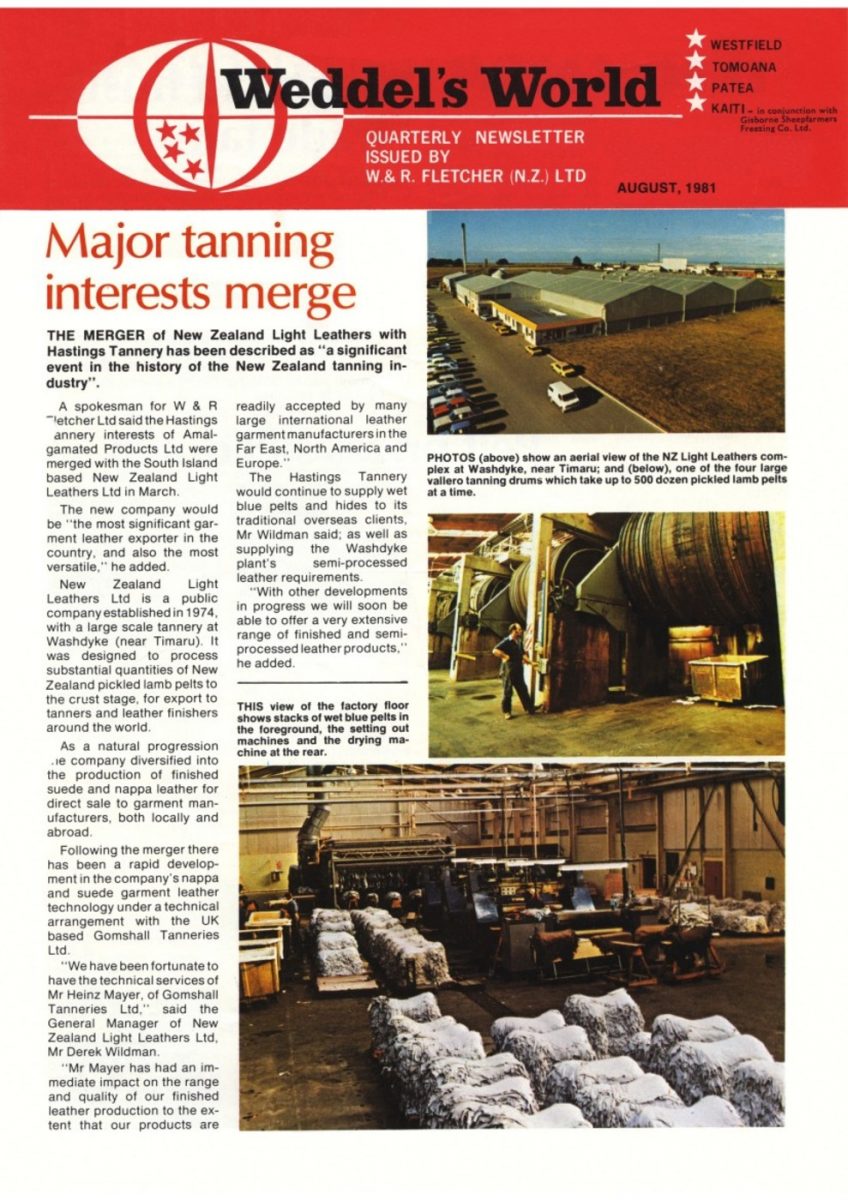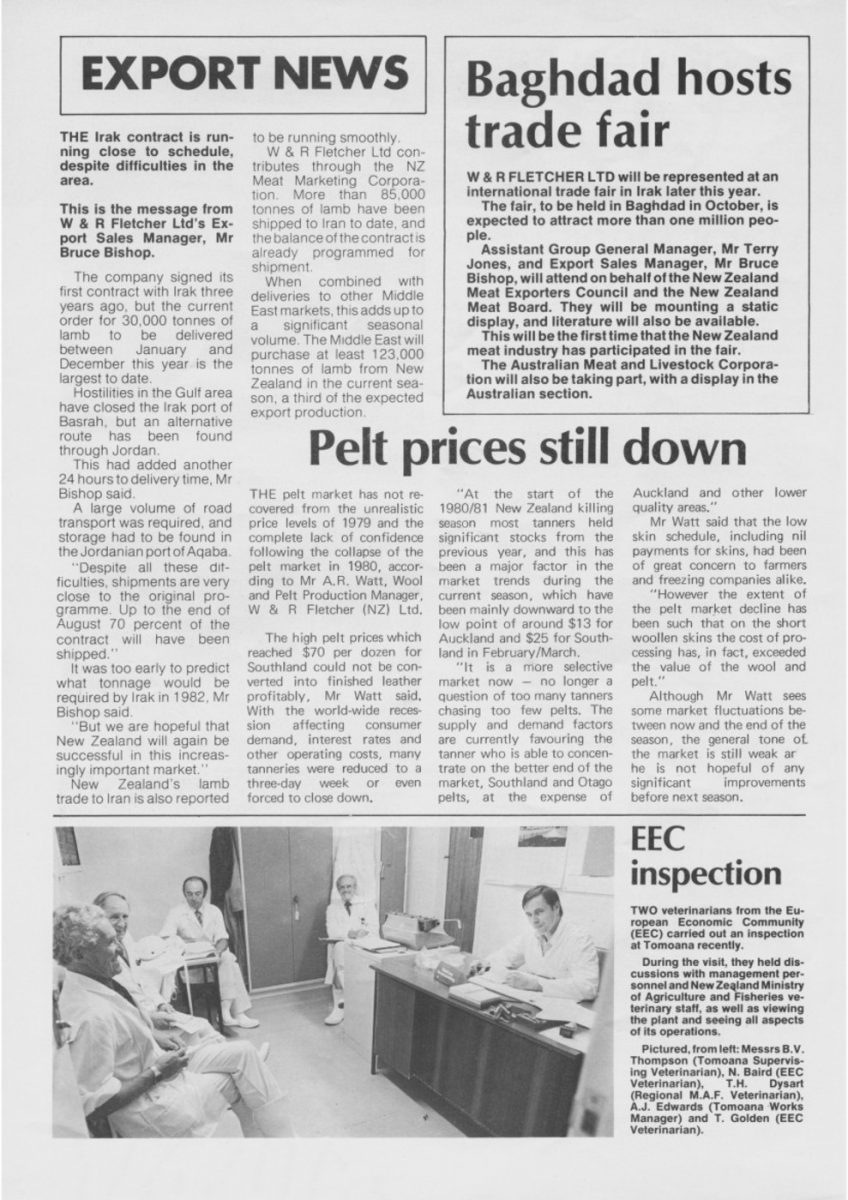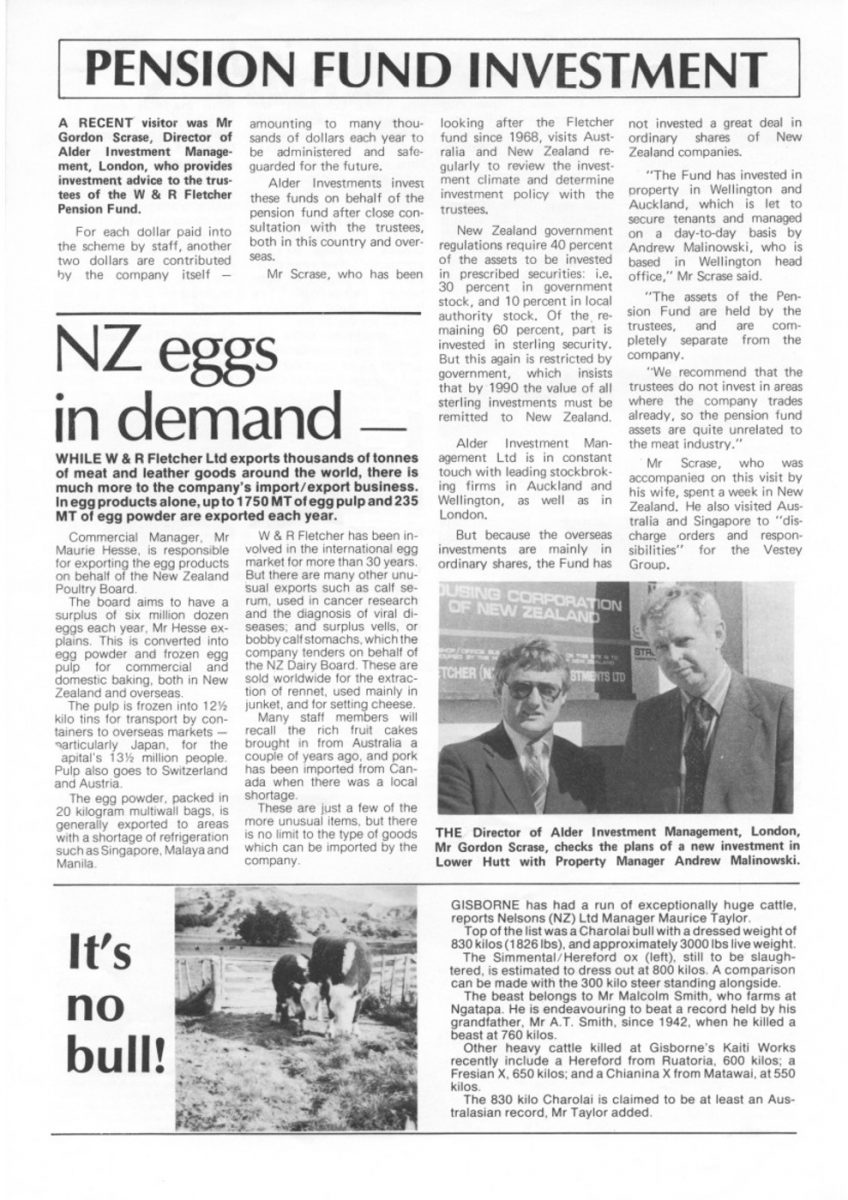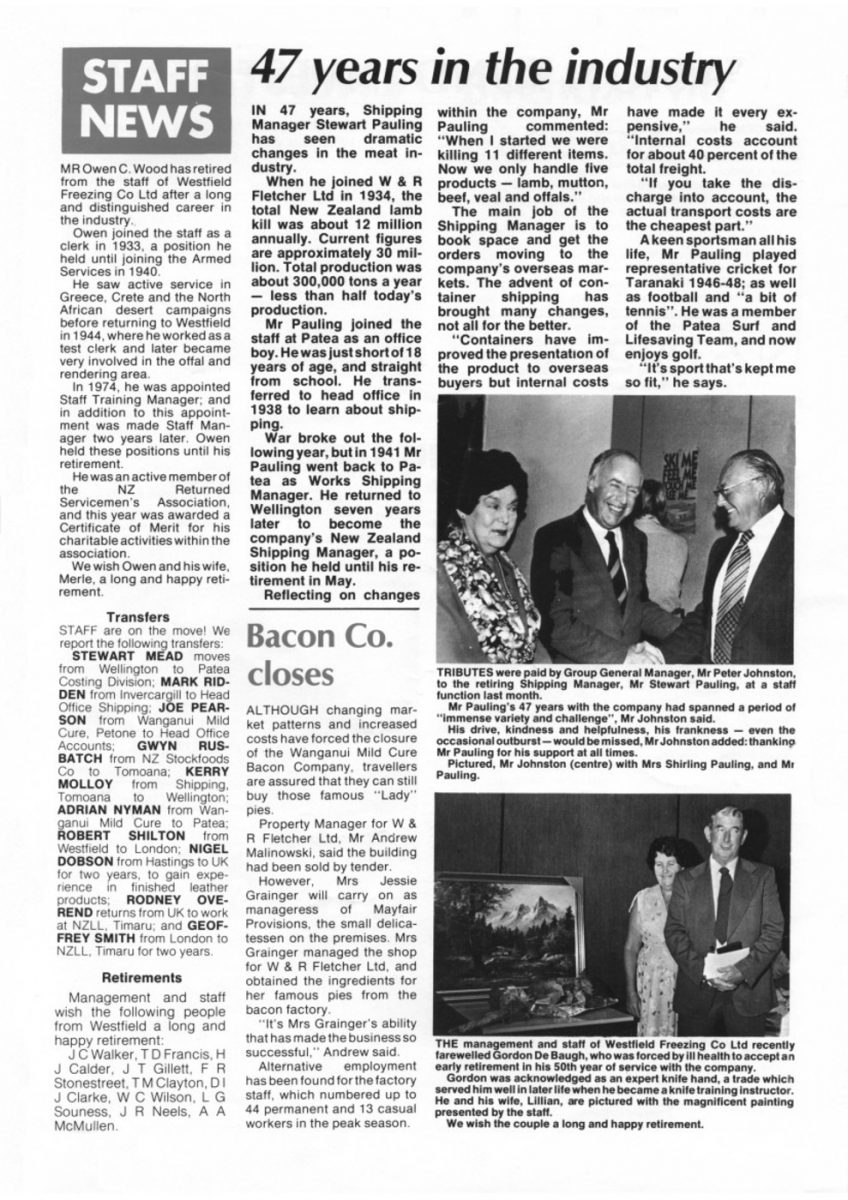- Home
- Collections
- SANDERS MJ
- Weddel's World
- Weddel's World 1981 - August
Weddel’s World 1981 – August
Weddel’s World
WESTFIELD
TOMOANA
PATEA
KAITI – in conjunction with Gisborne Sheepfarmers Freezing Co.
NZ QUARTERLY NEWSLETTER
ISSUED BY
W.& R. FLETCHER (N.Z.) LTD
AUGUST 1981
Major tanning interests merge
THE MERGER of New Zealand Light Leathers with Hastings Tannery has been described as “a significant event in the history of the New Zealand tanning industry”.
A spokesman for W & R Fletcher Ltd said the Hastings Tannery interests of Amalgamated Products Ltd were merged with the South Island based New Zealand Light Leathers Ltd in March.
The new company would be “the most significant garment leather exporter in the country, and also the most versatile,” he added.
New Zealand Light Leathers Ltd is a public company established in 1974, with a large scale tannery at Washdyke (near Timaru). It was designed to process substantial quantities of New Zealand pickled lamb pelts to the crust stage, for export to tanners and leather finishers around the world.
As a natural progression the company diversified into the production of finished suede and nappa leather for direct sale to garment manufacturers, both locally and abroad.
Following the merger there has been a rapid development in the company’s nappa and suede garment leather technology under a technical arrangement with the UK based Gomshall Tanneries Ltd.
“We have been fortunate to have the technical services of Mr Heinz Mayer, of Gomshall Tanneries Ltd,” said the General Manager of New Zealand Light Leathers Ltd, Mr Derek Wildman.
“Mr Mayer has had an immediate impact on the range and quality of our finished leather production to the extent that our products are readily accepted by many large international leather garment manufacturers in the Far East, North America and Europe.”
The Hastings Tannery would continue to supply wet blue pelts and hides to its traditional overseas clients, Mr Wildman said; as well as supplying the Washdyke plant’s semi-processed leather requirements.
“With other developments in progress we will soon be able to offer a very extensive range of finished and semi- processed leather products,” he added.
PHOTOS (above) show an aerial view of the NZ Light Leathers complex at Washdyke, near Timaru; and (below), one of the four large vallero tanning drums which take up to 500 dozen pickled lamb pelts at a time.
THIS view of the factory floor shows stacks of wet blue pelts in the foreground, the setting out machines and the drying machine at the rear.

EXPORT NEWS
THE Irak [Iraq] contract is running close to schedule, despite difficulties in the area.
This is the message from W & R Fletcher Ltd’s Export Sales Manager, Mr Bruce Bishop.
The company signed its first contract with Irak three years ago, but the current order for 30,000 tonnes of lamb to be delivered between January and December this year is the largest to date.
Hostilities in the Gulf area have closed the Irak port of Basrah, but an alternative route has been found through Jordan.
This had added another 24 hours to delivery time, Mr Bishop said.
A large volume of road transport was required, and storage had to be found in the Jordanian port of Aqaba.
“Despite all these difficulties, shipments are very close to the original programme. Up to the end of August 70 percent of the contract will have been shipped.”
It was too early to predict what tonnage would be required by Irak in 1982, Mr Bishop said.
“But we are hopeful that New Zealand will again be successful in this increasingly important market.”
New Zealand’s lamb trade to Iran is also reported to be running smoothly.
W & R Fletcher Ltd contributes through the NZ Meat Marketing Corporation. More than 85,000 tonnes of lamb have been shipped to Iran to date, and the balance of the contract is already programmed for shipment.
When combined with deliveries to other Middle East markets, this adds up to a significant seasonal volume. The Middle East will purchase at least 123,000 tonnes of lamb from New Zealand in the current season a third of the expected export production.
Baghdad hosts trade fair
W & R FLETCHER LTD will be represented at an international trade fair in Irak later this year.
The fair, to be held in Baghdad in October, is expected to attract more than one million people.
Assistant Group General Manager, Mr Terry Jones, and Export Sales Manager, Mr Bruce Bishop, will attend on behalf of the New Zealand Meat Exporters Council and the New Zealand Meat Board. They will be mounting a static display, and literature will also be available.
This will be the first time that the New Zealand meat industry has participated in the fair.
The Australian Meat and Livestock Corporation will also be taking part, with a display in the Australian section.
Pelt prices still down
THE pelt market has not recovered from the unrealistic price levels of 1979 and the complete lack of confidence following the collapse of the pelt market in 1980, according to Mr A. R. Watt, Wool and Pelt Production Manager, W & R Fletcher (NZ) Ltd.
The high pelt prices which reached $70 per dozen for Southland could not be converted into finished leather profitably, Mr Watt said. With the world-wide recession affecting consumer demand, interest rates and other operating costs, many tanneries were reduced to a three-day week or even forced to close down.
“At the start of the 1980/81 New Zealand killing season most tanners held significant stocks from the previous year, and this has been a major factor in the market trends during the current season, which have been mainly downward to the low point of around $13 for Auckland and $25 for South- land in February/March.
“It is a more selective market now – no longer a question of too many tanners chasing too few pelts. The supply and demand factors are currently favouring the tanner who is able to concentrate on the better end of the market, Southland and Otago pelts, at the expense of Auckland and other lower quality areas.”
Mr Watt said that the low skin schedule, including nil payments for skins, had been of great concern to farmers and freezing companies alike.
“However the extent of the pelt market decline has been such that on the short woollen skins the cost of processing has, in fact, exceeded the value of the wool and pelt.”
Although Mr Watt sees some market fluctuations between now and the end of the season, the general tone of the market is still weak and he is not hopeful of any significant improvements before next season.
EEC inspection
TWO veterinarians from the European Economic Community (EEC) carried out an inspection at Tomoana recently.
During the visit, they held discussions with management personnel and New Zealand Ministry of Agriculture and Fisheries veterinary staff, as well as viewing the plant and seeing all aspects of its operations.
Pictured, from left: Messrs B. V. Thompson (Tomoana Supervising Veterinarian), N. Baird (EEC Veterinarian), T. H. Dysart (Regional M. A .F. Veterinarian), A. J. Edwards (Tomoana Works Manager) and T. Golden (EEC Veterinarian).

PENSION FUND INVESTMENT
A RECENT visitor was Mr Gordon Scrase, Director of Alder Investment Management,London, who provides investment advice to the trustees of the W & R Fletcher Pension Fund.
For each dollar paid into the scheme by staff, another two dollars are contributed by the company itself – amounting to many thousands of dollars each year to be administered and safe-guarded for the future.
Alder investments invest these funds on behalf of the pension fund after close consultation with trustees, both in this country and overseas.
Mr Scrase, who has been looking after the Fletcher fund since 1968, visits Australia and New Zealand regularly to review the investment climate and determine investment policy with the trustees.
New Zealand government regulations require 40 percent of the assets to be invested in prescribed securities: i.e. 30 percent in government stock, and 10 percent in local authority stock. Of the, remaining 60 percent, part is invested in sterling security. But this again is restricted by government, which insists that by 1990 the value of all sterling investments must be remitted to New Zealand.
Alder Investment Management Ltd is in constant touch with leading stockbroking firms in Auckland and Wellington, as well as in London.
But because the overseas investments are mainly in ordinary shares, the Fund has not invested a great deal in ordinary shares of New Zealand companies.
“The Fund has invested in property in Wellington and Auckland, which is let to secure tenants and managed on a day to day basis by Andrew Malinowski, who is based in Wellington head office,” Mr Scrase said.
“The assets of the Pension Fund are held by the trustees, and are completely separate from the company.
“We recommend that the trustees do not invest in areas where the company trades already, so the pension fund assets are quite unrelated to the meat industry.”
Mr Scrase, who was accompanied on this visit by his wife, spent a week in New Zealand. He also visited Australia and Singapore to “discharge orders and responsibilities” for the Vestey Group.
PHOTO: THE Director of Alder Investment Management, London, Mr Gordon Scrase, checks the plans of a new investment in Lower with Property Manager Andrew Malinowski.
NZ eggs in demand –
WHILE W & R Fletcher Ltd exports thousands of tonnes of meat and leather goods around the world, there is much more to the company’s import/export business. In egg products alone, up to 1750 MT of egg pulp and 235 MT of egg powder are exported each year.
Commercial Manager, Mr Maurie Hesse, is responsible for exporting the egg products on behalf of the New Zealand Poultry Board.
The board aims to have a surplus of six million dozen eggs each year, Mr Hesse explains. This is converted into egg powder and frozen egg pulp for commercial and domestic baking, both in New Zealand and overseas.
The pulp is frozen into 12½ kilo tins for transport by containers to overseas markets – particularly Japan, for the Capital’s 13½ million people. Pulp also goes to Switzerland and Austria.
The egg powder, packed in 20 kilogram multiwall bags, is generally exported to areas with a shortage of refrigeration such as Singapore, Malaya and Manila.
W & R Fletcher has been involved in the international egg market for more than 30 years. But there are many other unusual exports such as calf serum, used in cancer research and the diagnosis of viral diseases, and surplus veils, or bobby calf stomachs, which the company tenders on behalf of the NZ Dairy Board. These are sold worldwide for the extraction of rennet, used mainly in junket, and for setting cheese.
Many staff members will recall the rich fruit cakes brought in from Australia a couple of years ago, and pork has been imported from Canada when there was a local shortage.
These are just a few of the more unusual items, but there is no limit to the type of goods which can be imported by the company.
It’s no bull!
GISBORNE has had a run of exceptionally huge cattle, reports Nelsons (NZ) Ltd Manager Maurice Taylor.
Top of the list was a Charolai [Charolais] bull with a dressed weight of 830 kilos (1826 lbs), and approximately 3000 lbs live weight. The Simmental/Hereford ox (left), still to be slaughtered, is estimated to dress out at 800 kilos. A comparison can be made with the 300 kilo steer standing alongside.
The beast belongs to Mr Malcolm Smith, who farms at Ngatapa. He is endeavouring to beat a record held by his grandfather, Mr A. T. Smith, since 1942, when he killed a beast at 760 kilos.
Other heavy cattle killed at Gisborne’s Kaiti Works recently include a Hereford from Ruatoria, 600 kilos; a Fresian X, 650 kilos; and a Chianina X from Matawai, at 550 kilos.
The 830 kilo Charolai is claimed to be at least an Australasian record, Mr Taylor added.

STAFF NEWS
MR Owen C. Wood has retired from the staff of Westfield Freezing Co Ltd after a long and distinguished career in the industry.
Owen joined the staff as a clerk in 1933, a position he held until joining the Armed Services in 1940.
He saw active service in Greece, Crete and the North African desert campaigns before returning to Westfield in 1944, where he worked as a test clerk and later became very involved in the offal and rendering area.
In 1974, he was appointed Staff Training Manager; and in addition to this appointment was made Staff Manager two years later. Owen held these positions until his retirement.
He was an active member of the NZ Returned Servicemen’s Association, and this year was awarded a Certificate of Merit for his charitable activities within the association.
We wish Owen and his wife, Merle, a long and happy retirement.
Transfers
STAFF are on the move!
We report the following transfers:
STEWART MEAD moves from Wellington to Patea Costing Division; MARK RIDDEN from lnvercargill to Head Office Shipping; JOE PEARSON from Wanganui Mild Cure, Petone to Head Office Accounts; GWYN RUSBATCH from NZ Stockfoods Co to Tomoana; KERRY MOLLOY from Shipping, Tomoana to Wellington; ADRIAN NYMAN from Wanganui Mild Cure to Patea; ROBERT SHILTON from Westfield to London; NIGEL DOBSON from Hastings to UK for two years, to gain experience in finished leather products; RODNEY OVEREND returns from UK to work at NZLL, Timaru; and GEOFFREY SMITH from London to NZLL, Timaru for two years.
Retirements
Management and staff wish the following people from Westfield a long and happy retirement:
J C Walker, T D Francis, H J Calder, J T Gillett, F R Stonestreet, T M Clayton, D I J Clarke, W C Wilson, L G Souness, J R Neels, A A McMullen.
47 years in the industry
IN 47 years, Shipping Manager Stewart Pauling has seen dramatic changes in the meat industry.
When he joined W & R Fletcher Ltd in 1934, the total New Zealand lamb kill was about 12 million annually. Current figures are approximately 30 million. Total production was about 300,000 tons a year – less than half today’s production.
Mr Pauling joined the staff at Patea as an office boy. He was just short of 18 years of age, and straight from school. He transferred to head office in 1938 to learn about shipping.
War broke out the following year, but in 1941 Mr Pauling went back to Patea as Works Shipping Manager. He returned to Wellington seven years later to become the company’s New Zealand Shipping Manager, a position he held until his retirement in May.
Reflecting on changes within the company, Mr Pauling commented: “When I started we were killing 11 different items. Now we only handle five products – lamb mutton, beef, veal and offals.”
The main job of the Shipping Manager is to book space and get the orders moving to the company’s overseas markets. The advent of container shipping has brought many changes, not all for the better.
“Containers have improved the presentation of the product to overseas buyers but internal costs have made it every expensive,” he said. “Internal costs account for about 40 percent of the total freight.
“If you take the discharge into account, the actual transport costs are the cheapest part.”
A keen sportsman all his life, Mr Pauling played representative cricket for Taranaki 1946-48; as well as football and “a bit of tennis”. He was a member of the Patea Surf and Lifesaving Team, and now enjoys golf.
“It’s sport that’s kept me so fit,” he says.
TRIBUTES were paid by Group General Manager, Mr Peter Johnston, to the retiring Shipping Manager, Mr Stewart Pauling, at a staff function last month.
Mr Pauling’s 47 years with the company had spanned a period of “immense variety and challenge”, Mr Johnston said.
His drive, kindness and helpfulness, his frankness – even the occasional outburst – would be missed, Mr Johnston added: thanking Mr Pauling for his support at all times.
Pictured, Mr Johnston (centre) with Mrs Shirling Pauling, and Mr Pauling.
Bacon Co. closes
ALTHOUGH changing market patterns and increased costs have forced the closure of the Wanganui Mild Cure Bacon Company, travellers are assured that they can still buy those famous “Lady” pies.
Property Manager for W & R Fletcher Ltd, Mr Andrew Malinowski, said the building had been sold by tender.
However, Mrs Jessie Grainger will carry on as manageress of Mayfair Provisions, the small delicatessen on the premises. Mrs Grainger managed the shop for W & R Fletcher Ltd, and obtained the ingredients for her famous pies from the bacon factory.
“It’s Mrs Grainger’s ability that has made the business so successful,” Andrew said.
Alternative employment has been found for the factory staff, which numbered up to 44 permanent and 13 casual workers in the peak season.
PHOTO: THE management and staff of Westfield Freezing Co Ltd recently farewelled Gordon De Baugh, who was forced by ill health to accept an early retirement in his 50th year of service with the company.
Gordon was acknowledged as an expert knife hand, a trade which served him well in later life when he became a knife training instructor. He and his wife, Lillian, are pictured with the magnificent painting presented by the staff.
We wish the couple a long and happy retirement.

Non-commercial use

This work is licensed under a Attribution-NonCommercial 3.0 New Zealand (CC BY-NC 3.0 NZ).
Commercial Use
Please contact us for information about using this material commercially.Can you help?
The Hawke's Bay Knowledge Bank relies on donations to make this material available. Please consider making a donation towards preserving our local history.
Visit our donations page for more information.
Description
Surnames in this newsletter –
Baird, Bishop, Calder, Clarke, Clayton, De Baugh, Dobson, Dysart, Edwards, Francis, Gillett, Golden, Grainger, Hesse, Johnston, Jones, Malinowski, Mayer, McMullen, Mead, Molloy, Neels, Nyman, Pauling, Pearson, Ridden, Rusbatch, Scrase, Shilton, Smith, Souness, Stonestreet, Taylor, Thompson, Walker, Watt, Wildman, Wilson, Wood










Do you know something about this record?
Please note we cannot verify the accuracy of any information posted by the community.